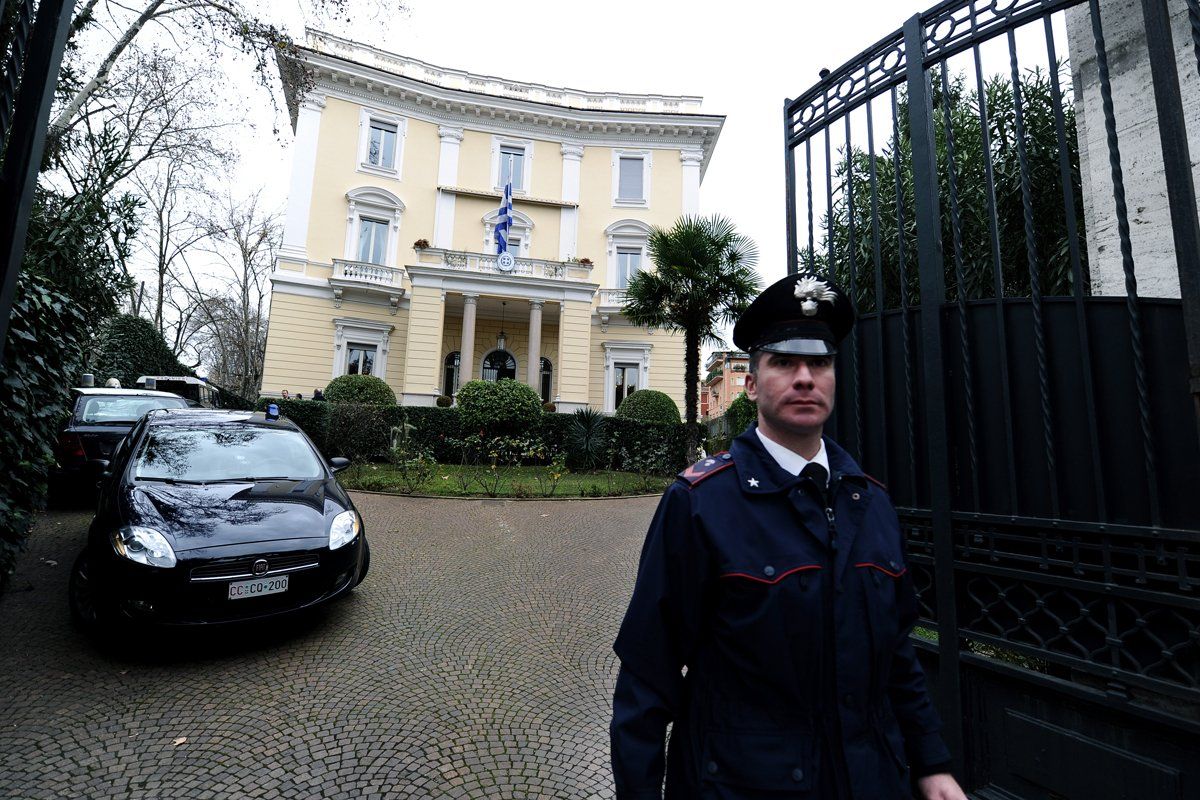
Just before 11 a.m. on Dec. 23 in the mailroom of the Swiss Embassy in Rome, a parcel bomb exploded, blowing up the right hand of a 53-year-old embassy functionary and embedding a steel bolt in his chest. An hour later, another parcel bomb exploded at the Chilean Embassy, injuring a worker there and, as the ambassador described, "splattering blood everywhere." Suspicious packages also were found at the Ukrainian and Slovenian embassies that both proved false alarms. Sirens blew, streets were closed and sidewalk barriers were erected all across Rome's tony embassy neighborhoods on the eve of one of the most celebrated holiday weeks in this city. On Christmas Day, heightened security marked the pope's annual "Urbi et Orbi" message to Rome and the world with riot police and anti-bomb vehicles parked a few hundred feet from St. Peter's Square.
But extra security wasn't enough. On Monday morning, workers at the Greek Embassy in Rome found another parcel bomb. The device was meant to detonate last Thursday in tandem with the others, but Rome's slow mail system outwitted the would-be bombers, and the package only arrived on Friday, after the embassy had closed for the holiday weekend. This time, workers knew not to open anything that looked even slightly suspicious, but the effect, even undetonated, was dramatic. "This is a wave of terrorism against the embassies," said Rome mayor Gianni Alemanno. "It's more worrying than a single attack."
Even though the Greek bomb didn't detonate, the message got through. Last week's bombs, like the one found Monday morning at the Greek Embassy, each contained tiny metal boxes in which a computer-scroll message read: "We have decided to make our voices heard again, with words and with facts. We will destroy the system of dominance, long live the FAI [Informal Anarchy Federation]. Long live anarchy." FAI is an umbrella group under which Italian police say several anarchist movements function. Italian authorities say they are also responsible for violent riots in Rome earlier this month.
The messages also contained a reference to Lambros Fountas, a Greek anarchist who was shot dead in Athens last March, and the words of Mauricio Morales, a Chilean anarchist who was killed in 2009 when a parcel bomb intended for someone else exploded in his backpack. Both men are de facto martyrs for tightly knit anarchist groups working out of Greece, Spain, and Italy. Several Italian anarchists in Swiss prisons also have recently gone on hunger strikes, calling upon their fellow anarchists to act out. Italy's interior minister, Roberto Maroni, called upon authorities in Greece to cooperate in what he called a counteroffensive to "combat" what he worries is the beginning of a violent offensive. Maroni cited a similar event in November, when anarchists sent 14 letter bombs to embassies in Athens.
Discovering whether there are any additional pre-Christmas bombs en route to embassies in Rome hung up in a slow mail system, or whether this is the beginning of an all-out homegrown war, is the top priority for Rome police, who fear that more package bombs might be awaiting unsuspecting embassy workers as the city churns back to life after the long holiday week between Christmas and New Year's Eve. Many embassies, including the American Embassy in Rome, closed on Dec. 22 and won't open again until Tuesday. Many others won't open until later in the week or after the New Year's holiday.
Moments after the Greek bomb was found on Monday morning, police were called to check out suspicious packages at 14 other embassies, among them Albania, Argentina, Denmark, Egypt, Estonia, Finland, France, Kuwait, Monaco, and Venezuela. Only the Greek bomb contained explosives, but the incident sowed sheer panic among the city's diplomatic circles. The Swedish Embassy has closed its doors indefinitely for security reasons, and the Spanish Embassy has set up metal detector for the postal carriers and holiday party guests.
The Greek ambassador was quick to point out that Monday's bomb was a pre-Christmas hangover and not a sign of a new offensive. "It had arrived on Friday," Michalis Cambanis told The Daily Beast outside the cordoned-off embassy. "The staff thought it looked suspicious and knew immediately to call police. It was the right thing to do."
But doing the right thing will hardly provide protection against a violent and unpredictable anarchist movement that looks set to kick off 2011 with a bang.
This story also appears on The Daily Beast web site.
Uncommon Knowledge
Newsweek is committed to challenging conventional wisdom and finding connections in the search for common ground.
Newsweek is committed to challenging conventional wisdom and finding connections in the search for common ground.





